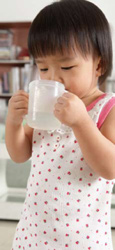Dehydration occurs as a result of insufficient fluids, either from lack of intake or excessive losses. Infants and young children are at greater risk due to their higher body surface area. They also have less water in their system compared to adults.
The body loses water and minerals through perspiration, urination and passage of stools. Under normal circumstances, these losses are balanced by oral fluid intake. However, certain conditions can cause excessive water loss. A large amount of water and electrolytes can be lost rapidly if the child has severe diarrhoea. This may be exacerbated by concomitant vomiting. Excessive sweating due to excessive heat may also lead to dehydration.
Dehydration Sign & Symptoms
Dehydration can be divided into three stages. Mild dehydration has very little indication. However, children and infants may progress to moderate and severe stages rapidly.
- Mouth is still moist.
- Thirsty. An older child can indicate he is thirsty. Younger ones will ask for more water.
- Normal urine output.
- Dry mouth and tongue.
- Feeling of thirst.
- Sunken frontanelle (front part of the head) and eyes.
- Loss of skin turgor. When the skin is pinched and released, it does not retract immediately.
- Reduced or concentrated urine.
- Normal or low blood pressure.
- Very dry mouth and tongue.
- Lethargic or comatose.
- Cold skin surface, muscle cramps.
- Very little or no urine output.
- No tears when crying.
- Marked loss of skin turgor.
- Rapid heart rate.
- Small pulse volume.
- Very low blood pressure.
Treatment of Dehydration
Dehydration is treated through fluid and electrolyte replacement, which can be achieved through oral intake or intravenous drip in severe cases.
Fluids such as plain water and juices can be frequently given for fluid replenishment, whereas breastfed infants should continue breastfeeding. Oral rehydration salts are also useful in replacing both fluids and electrolytes. For solid food, rice porridge has been found to reduce the duration of diarrhoea. Banana, a source of potassium, is needed as low levels of potassium (lost in stool and vomit) cause muscle weakness, and, in severe cases, irregular heart rhythm.
You can continue with your child’s regular formula milk. But if the diarrhoea is due to lactose intolerance, your child’s paediatrician may advise to switch to a lactose-free formula until his symptoms resolve.
If the ill child refuses to take his regular drink, let him suck on ice chips; it’s fun and provides him fluids. Avoid giving drinks containing caffeine or high sugar content. Caffeine is a diuretic, causing urination and further fluid loss. Sugar acts as a mild laxative and may increase bowel movement.
Make sure your child drinks plenty of water daily, Encourage him to drink at the first signs of illnesses, eg vomiting and diarrhoea. DO NOT wait for signs of dehydration. If there are any worrying signs or symptoms, or if his condition does not improve after 3-4 days, see the doctor immediately.
Dehydration Death
Diarrhoeal disease is the second leading cause of death in children below five years, and mainly affects children below two years. As it can last for several days, the child loses a lot of water and minerals, both of which are essential for normal bodily functions. If treatment is not initiated, death may ensue following multi-organ failure.






Comments